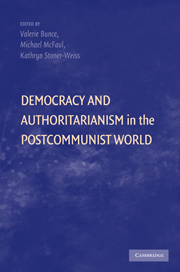Book contents
- Frontmatter
- Contents
- Prologue
- PART I WAVES OF REGIME CHANGE: FROM DICTATORSHIP TO DEMOCRACY…AND BACK?
- PART II ENCOURAGING DEMOCRACY: THE ROLE OF THE EUROPEAN UNION
- PART III CHOOSING REGIME CHANGE: DEMOCRATIZING ELECTIONS
- 5 A Postcommunist Transition in Two Acts
- 6 Defining and Domesticating the Electoral Model
- 7 Georgia's Rose Revolution
- 8 Importing Revolution
- PART IV RESISTING REFORM: BACKSLIDING DEMOCRACIES AND ENDURING AUTOCRACIES
- Epilogue
- Index
- References
5 - A Postcommunist Transition in Two Acts
The 1996–7 Antigovernment Struggle in Bulgaria as a Bridge between the 1989–92 and 1996–2007 Democratization Waves in Eastern Europe
Published online by Cambridge University Press: 05 June 2012
- Frontmatter
- Contents
- Prologue
- PART I WAVES OF REGIME CHANGE: FROM DICTATORSHIP TO DEMOCRACY…AND BACK?
- PART II ENCOURAGING DEMOCRACY: THE ROLE OF THE EUROPEAN UNION
- PART III CHOOSING REGIME CHANGE: DEMOCRATIZING ELECTIONS
- 5 A Postcommunist Transition in Two Acts
- 6 Defining and Domesticating the Electoral Model
- 7 Georgia's Rose Revolution
- 8 Importing Revolution
- PART IV RESISTING REFORM: BACKSLIDING DEMOCRACIES AND ENDURING AUTOCRACIES
- Epilogue
- Index
- References
Summary
With the collapse of the Soviet Union, some of its former republics (Latvia, Lithuania, and Estonia) and some of the Central European satellites (the Czech Republic, Hungary, and Poland) quickly entered the ranks of capitalist democracies. The remaining majority of new post-Socialist states have carried on as hybrid regimes or as autocracies with mixed marketization records. Among them Bulgaria stood out with its unique coupling of a quick transition to parliamentary democracy and a lack of sustained commitment to economic reforms. Only at the beginning of 1997 did the country resolve the economic regime question by achieving a consensus on a larger “civilizational” choice to wholeheartedly seek admission to the European Union (EU) as a way to make the transition to a market economy irreversible in the immediate term and to acquire a new liberal democratic home in the international system in the long run.
What explains this critical juncture? How were the country's illiberal incumbents and their antireform agenda defeated? This chapter argues that by capitalizing on public discontent with and mass mobilization against the social consequences of the Left economic governance (the “Socialist third way”), the Right forged a consensus in favor of a prodemocratic, promarket, and pro-Western political agenda. This in effect ended the parity between the ex-Communists (the Left) and their former opposition (the Right) – a balance of power that had frustrated the economic transition and the consolidation of democracy within the country.
- Type
- Chapter
- Information
- Democracy and Authoritarianism in the Postcommunist World , pp. 107 - 133Publisher: Cambridge University PressPrint publication year: 2009
References
- 1
- Cited by



